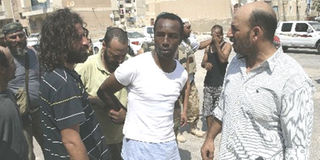UN rights team concerned about abuse of black Africans in Libya

Rebel fighters arrest a soldier of Gaddafi’s forces during search for Libyan leader Muammar Gaddafi’s forces in Tripoli, Libya, August 26, 2011. Libyan vigilante groups have been accused of serious human rights abuses. Photo/XINHUA
A UN human rights team set up to investigate rights violations in Libya said Wednesday it was concerned about allegations that many black Africans were being illegally detained in Libya.
It also pointed to allegations that many official documents were destroyed in the battle for Tripoli, warning that this may hamper attempts to bring perpetrators of violations to justice.
“In recent weeks, reports have emerged of the mass arrest of black Africans who are suspected of being pro-Gaddafi mercenaries,” Philippe Kirsch, a member of the International Commission of Inquiry on Libya told the Human Rights Council.
“It has been reported that large numbers of migrant workers from Chad, Mali, Niger, Nigeria and Sudan have allegedly been arbitrarily arrested by security forces of the NTC in Tripoli,” he said.
Mr Kirsch said that the detainees were reportedly being held in prisons at Ain Zara, Tajouran and the Mitiga Airbase, as well as temporary detention facilities at the National Oil Institute, the Bab al-Bahr football club and local schools.
“There are also allegations that dark-skinned Libyans have also been arbitrarily arrested and detained,” Mr Kirsch said, adding that many had not yet been brought before a judge to review the legality of their detention.
In his update on the UN probe, Mr Kirsch also lamented allegations that official documents were destroyed during the fall of Tripoli, which he said would hamper bringing to justice those responsible for rights violations.
“The commission is concerned about reports it has received regarding the destruction and loss of official records and documents, which were left unattended when pro-Kadhafi forces fled Tripoli,” Mr Kirsch said.
“The loss or destruction of crucial documents and records could have an impact on the efforts of the commission to establish the truth about human rights violations,” he added, urging local authorities to protect all documents so that “those responsible for human rights violations are held accountable”.
The 47-member UN Human Rights Council set up the investigative team in February at the beginning of the conflict between Moamer Kadhafi’s regime and rebels.
After visiting Libya, neighbouring Egypt and Tunisia during the first half of the year, Kirsch said the investigative team was planning to go to Tripoli, western Libya and Benghazi in the latter part of 2011 and January 2012.
Previously, the International Organisation for Migration had also warned that people of African descent were being targeted in Libya.
Last week, it said it had begun evacuating over half of around 2,000 sub-Saharan Africans who are stranded in the town of Dirkou in neighbouring Niger, after having fled fighting in Libya.
“There has been a surge in sub-Saharan Africans arriving, largely citing the targeting of Africans as the reason for leaving,” an IOM spokeswoman said.
Libya’s new rulers have promised to investigate allegations of “serious abuses” including war crimes against their troops.
The National Transitional Council was responding to a report released by London-based human rights watchdog Amnesty International that accused the fighters who brought down the Gaddafi regime.
The NTC acknowledged “a small number of incidents involving those opposed to Gaddafi and vowed to investigate Amnesty’s allegations.
Amnesty said in the first days of the uprising groups of anti-Gaddafi protesters killed a number of captured soldiers and suspected mercenaries.
“Some were beaten to death, at least three were hanged, and others were shot dead after they had been captured or had surrendered,” Amnesty said.
“The NTC is facing a difficult task of reining in opposition fighters and vigilante groups responsible for serious human rights abuses, including possible war crimes, but has shown unwillingness to hold them accountable,” it said.
But Amnesty acknowledged the alleged atrocities were of a “smaller scale” than those carried out by Gaddafi’s regime, which it says may be responsible for crimes against humanity.
In a statement, the council’s executive committee said it “strongly condemns any abuses perpetrated by either side”.
“The NTC is firmly committed to human rights and the rule of law, both international and local,” it said.
In his first public speech since arriving in Tripoli on Saturday, Libya’s interim leader Mustafa Abdel Jalil told thousands of supporters in Martyrs’ Square that moderate Islam would be Libya’s main source of legislation.
“We will not accept any extremist ideology, on the right or the left. We are a Muslim people, for a moderate Islam, and we will stay on this road,” he said Monday night.
The World Bank said its decision was based on “evolving events in Libya and the views of member countries.”
Meanwhile, at least 25,000 people died in the uprising against Gaddafi and 50,000 more were wounded, the country’s interim leader told a UN summit.
National Transitional Council chairman Mustafa Abdel Jalil thanked the international community for their help in the months-long Libyan revolution, and while he told the summit that Kadhafi’s regime members would face justice, he vowed that they would get “a fair trial.”
“We have lost 25,000 martyrs, there are double that number of wounded,” Mr Jalil told US President Barack Obama, UN Secretary General Ban Ki-moon, French President Nicolas Sarkozy and other leaders at the summit.
Mr Jalil thanked the United Nations and all countries which helped with “the success of the Libyan revolution,” which he said had been crucial because of the “huge amount of weaponry that Kadhafi deployed against his people.”
The NTC chairman said many Gaddafi regime members had been detained and some had been freed again.
He said many would face justice but insisted that all would get a “fair trial”.
Kadhafi is still on the run.




